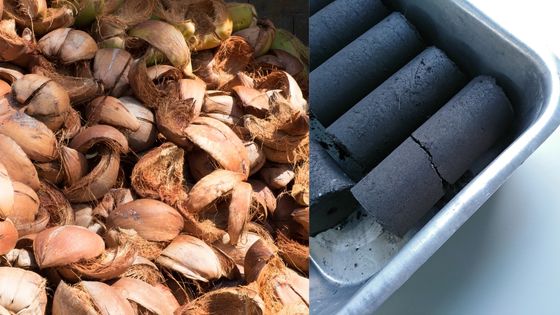Want to contact Coconut Shell Charcoal Suppliers? To make coconut shell charcoal, we use coconut husk. Because it is a vapor-activated material, it contains no chemical agents that can contaminate or react with the medium in which we use it.
Coconut shell charcoal is extremely stiff, hard, and durable. The adsorption capacity, it directly relates to the contact area, most manufacturers use it. They use it to determine the quality of activated coconut charcoal. Moreover, they perform some adsorption tests with an iodine solution.

The key is in the activation process used (by steam or chemical reaction), as well as the residence time, temperature, pressure, and operating conditions in general. As a result, we can use activated coconut shell charcoal in air purification, removing odors. As well as a variety of organic gases or solvents. It aids in natural gas purification by adsorbing highly toxic hydrogen sulfide.
What Exactly Is Activated Charcoal Made from Coconut Shells?
Coconut is a fruit that comes from the coconut palm, the world’s most cultivated palm. The Philippines, Indonesia, and India are the top producers. It can reach a height of about 25 meters during its growing stage. We extract activated carbon from the coconut shell after undergoing physical or chemical activation processes.
Coconut shell-activated charcoal is microporous and adsorbs low molecular weight organic pollutants that are prevalent in well water more efficiently. All activated carbon, whether vegetable or mineral, contains inorganic salts and elements, some of which are water-soluble.
How Is Activated Coconut Shell Charcoal Made?
From the shells of coconut, we make coconut shell charcoal. It is environmentally friendly because if we use the husks of small coconuts, which would otherwise go to waste. In the process, we heat the coconut shell to over 1000 degrees Celsius without the presence of oxygen to activate it. Activated means it has 100% adsorption capability and maximum porosity.
We use the adsorption process in the activated carbon. Do not mix up absorption and adsorption. Adsorption is a process that traps or retains atoms, ions, gas molecules, liquids, or dissolved solids on a surface, whereas absorption is a volume phenomenon. Coconut-activated carbon contains 70 to 80% carbon, is practically pure, and has an ash content ranging from 5 to 10%.
Moreover, we can utilize activated coconut shell charcoal in a variety of ways. We use it to treat acute poisoning in humans as well as gastrointestinal issues. Many people use it to purify water, deodorize and purify air and water, remove organic substances, recover solvents, and as a catalyst.
What Are the Advantages of Activated Coconut Shell Charcoal?
Detoxifier Natural
Coconut shell charcoal aids in detoxification. For colon cleansing therapies and detoxifying products, we can use it as one of the ingredients. It can absorb toxins and eliminate them through the digestive tract, making it an essential cleaning system.
It cures poisoning
To treat poisoning and overdose by oral ingestion, furthermore, we can utilize it as an adsorbent agent. Prevents poison from being absorbed in the stomach. Toxins from the stomach and intestine are absorbed by coal.
Aids in the reduction of cholesterol levels
Activated carbon lowers blood levels of cholesterol, lipids, and triglycerides.
Gastric Relief
Removing excess gas from the digestive tract relieves stomach pain.
Rejuvenating Action
We use activated charcoal to counteract the effects of aging in the body. It acts best as it aids in the processes of the liver, kidneys, and adrenal glands, preventing excessive cell aging.
Skin Care
Many beauty products now contain activated coconut charcoal. This is due to its effectiveness in removing bacteria, chemicals, and impurities. It is regulatory sebum that is extremely beneficial in cases of acne and skin blemishes.
However, we use it to lower LDL cholesterol, reduce flatulence, and improve renal function by reducing the number of waste products that the kidneys must filter.
Avoid consuming it within two hours of taking vitamins, medications, or supplements because it will prevent the body from absorbing them. Activated coconut charcoal has no odor, taste, or toxins. In addition, activated carbon is a popular ingredient in almost all of our beauty and personal care products. In recent years, it has become both a trend and a source of contention.

















